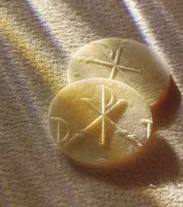 The two readings for mass today have to do with hungry people. The Israelites in the first reading today were actually crying to Moses that they didn’t have any meat or vegetables to eat, like they used to have in Egypt. It sounds like they were getting more than a little tired of the manna that God gave them to eat each day. Even Moses became upset with God over it, especially since he had to endure their crying and complaining and there was nothing he could do about it. Moses sounds like he is pretty irritated with God for making him responsible for the well being of His people. He just can’t seem to endure it anymore and would rather face death than continue to listen to their complaints about the manna.
The two readings for mass today have to do with hungry people. The Israelites in the first reading today were actually crying to Moses that they didn’t have any meat or vegetables to eat, like they used to have in Egypt. It sounds like they were getting more than a little tired of the manna that God gave them to eat each day. Even Moses became upset with God over it, especially since he had to endure their crying and complaining and there was nothing he could do about it. Moses sounds like he is pretty irritated with God for making him responsible for the well being of His people. He just can’t seem to endure it anymore and would rather face death than continue to listen to their complaints about the manna.
Now … contrast that with the gospel today.
First of all, Jesus traveled by boat to a deserted place by himself after John the Baptist was beheaded. Jesus seemed to need solitude, probably so that he grieve John’s death. The crowds followed him though. The gospel said they followed him on foot “from the towns” which suggests that they traveled long distances to see him.
When Jesus stepped ashore and saw the large crowd, his reaction was not one of irritability over the unexpected intrusion of his privacy though. Mothers and fathers should think about this passage in the bible when their children interrupt them in the shower or other “me time” that parents try to find. Their children come to them because they love them, though. They need something, even if it’s just attention. And so it was with the crowd that followed Jesus. Jesus set aside his need for privacy and paid attention to the people who came before him. He had compassion for them their needs and he cured their sick.
There is something that is not explicitly said in the gospel, but Jesus had compassion on the crowd, he loved them right where they were in that present moment. He did not use that moment as an opportunity to warn them of all the dangers of sin, and it would have been understandable if he had done so because he had just received news of the beheading of John the baptist. This shows how completely different Jesus is from Moses and most of us as well, because Jesus put aside his own feelings and thought only of the people who came to see him. They touched his heart.
The crowds who came to see Jesus were not complaining over not having any food to eat though, even though the disciples were concerned for them. They were hungry for a different kind of food. The food they were hungry for was Jesus. And Jesus fed them. He told his disciples “you give them something to eat”. The disciples brought a small amount of bread and fish to Jesus and Jesus blessed the bread, broke the loaves and gave them to the disciples and the disciples gave them to the crowds. Doesn’t this sound vaguely familiar? It’s actually pretty awesome that our priests, who are Christ’s modern disciples, does the same thing for all of us at mass each week.
Both of the readings for mass today prefigure the Eucharist. The manna in the old testament was the bread from heaven that God gave his people to survive on in the wilderness. No frills, just sustenance. Then God gave His people living bread from heaven, in the form of his son, who would give life to the whole world. The miracle that Christ performed in feeding five thousand people in today’s gospel, prefigures the Eucharist that we receive at every mass. Even the manner in which Jesus told his disciples to feed the people themselves, he blessed the bread, broke it and gave it to his disciples to feed the people is the foundation in scripture for how we receive communion at mass too. This continues to be a miracle too, when the bread is transformed into the body of Christ by the modern disciples of Christ, our priests.
However, the over riding theme of both of the readings for mass today is that God loved our ancestors enough to feed them Himself when they were in the wilderness, and then send his son to us as living bread, to eat until the end of time. Christ also loved us enough to give his life for us and to continue to be with us for the rest of our lives, in his body and blood that we receive in communion at each mass.
We should remember Christ’s compassion, his love and his healing presence every time we receive communion at mass. He loves us just as much as the five thousand people he fed in the gospel, except Jesus comes to us himself in the Eucharist, every time we receive him, and will continue to do so for the rest of our life. Jesus himself is food for our journey.
